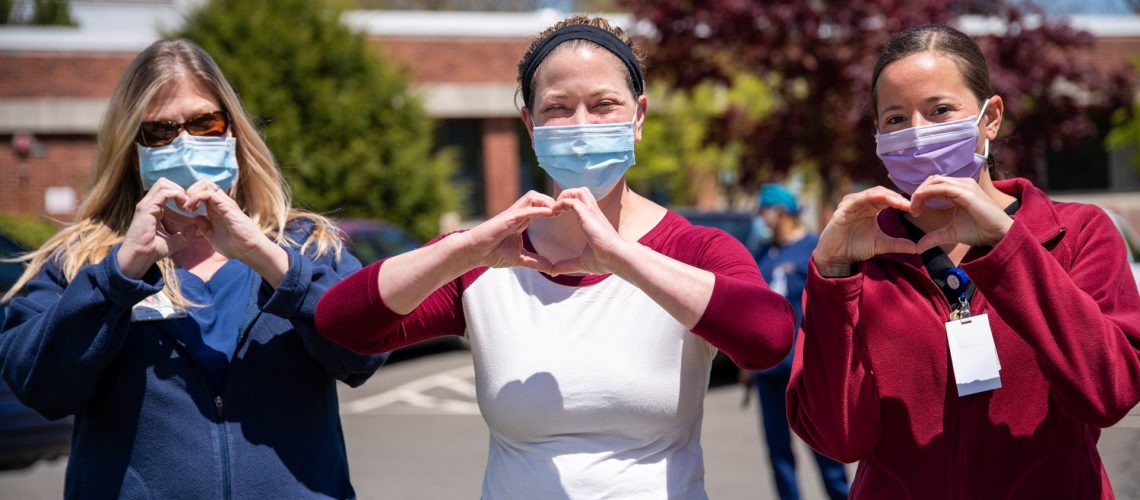It was July 5, 1991, and it was my first night on call. St. Margaret’s was a 250-bed hospital with two interns on call through the night. One intern had the ICU and the monitored floor. The other intern—that was me—was responsible for the rest of the hospital. Because the ICU intern was dealing with the sickest patients, the senior resident stayed with her. I had the help of a “short call” resident, a position created just for the month of July, to help new interns. Short call went home at 10 pm.
I didn’t know what to expect, but the system that had trained us—years of training and rotations and study—had declared in its wisdom that I was ready. Perhaps I was, but mostly I was scared.
I’d dutifully packed my on call bag as I had been trained: stethoscope, otoscope, ophthalmascope, tuning forks, eye chart, reflex hammer. In my hopefulness, I’d also packed a box of crayons, thinking I could help patients communicate easier by drawing when they might be too afraid to speak. I hoped too, that it would help them access their deeper wisdom, help them figure out what was going wrong in their bodies. Over the course of my training, my supervisors and my fellow residents would come to tolerate my crayons. But that first night was a busy one. I admitted eighteen patients, and I would never have a chance to use the crayons.
Just before midnight a patient died. I’d only seen a few dead people in medical school, and I’d never pronounced anyone. I walked up the stairwell to the 4th floor and found the charge nurse.
She was a solid, gruff woman. Nothing about her was “touchy-feely”. She had seen more first-time, twenty-something interns pass through her floor then I could imagine.
She was also competent and professional, and she cared deeply about her patients.
“I’ve never done this before,” I told her bluntly. I wasn’t about to try to bluff my way through anything.
In the patient’s room she guided me, step by step, through what to do. I’m sure I took longer listening for a heartbeat and a breath, trying to elicit a pain response, even looking for a papillary response, than I ever took again. It was a tremendous responsibility. Not until I pronounced death, stated the time of death, would this person be considered dead.
Alone in the stairwell, sitting on the steps, I cried. I remember thinking I wouldn’t be able to finish the night. At three in the morning, another patient died. The nurse reminded me what to do, and after I had pronounced this second death, she gave me a slip of paper with a phone number.
“It’s his son. You can’t tell him his father has died. You have to say ‘He took a turn for the worst’.” It was hospital policy that no one could announce death to a loved one over the phone. They were afraid of litigation if the family member got in a car accident on the way to the hospital. I made the call and began my paperwork.
The man’s son burst out of the elevator doors. “Is he dead? Is he dead?!” he yelled as he ran towards the nurses’ station where I was awaiting him. I mumbled something about being sorry, but he had already started running down the hall to his father’s room. I remember it still: the dimmed hallway, the hushed carpet, a large, forty-something man, lumbering down the hall, shouting for his father, “Pappy! Pappy!” It was raw, honest, grief.
By the time I got to the room, the son was yelling at his father’s nurse, a young woman who’d just graduated from nursing school. “You told me to go home. You told me he’d be okay.” She was crying. The charge nurse had followed me into the room. She took the man over to a chair, she sat him down, and then she squatted before him.
“Sometimes a person needs their loved ones gone in order to let go. Your father loved you too much; your love was too strong. He couldn’t do it, he couldn’t let go with you here.” The man began to cry and slumped over. The charge nurse hugged him.
One of the things I hadn’t expected about hospital call was just how alone I was. In the quiet hours when late night turns into early morning, there is a hush in a hospital that makes any activity seem larger, louder. The sound of my beeper going off as I’d try to examine a new patient or write up orders startled me. Nurses on floors I’d never stepped foot onto were calling about patients I had never met, asking for meds, evaluations, new orders. Who was I to “order” the nurse, to determine what the patient needed? But over the course of that night, it became clear to me that I wasn’t alone; the nurses were my lifeline. They knew their patients, knew what worked and what didn’t, gently guided me towards appropriate dosing and walked me through the routines of the hospital. Nurses, giving meds, changing dressings, tending a patient, have the opportunity to know a patient in a way that doctors rarely do.
In some ways, medical education comes easy. Year after year, book after book, rotation after rotation. But wisdom is another matter. Schooling and books can point you in the right direction, but wisdom requires something within ourselves, and guidance comes from places least expected. The wise eyes of a dying baby, the last breath of an ailing grandmother, comforting her family in their grief to come, a charge nurse on the midnight shift who has seen and knows the many ways in which we pass. I learned many more lessons from that nurse. I suspect I learned more from her than from any physician involved in my medical education. I learned how to be with people, how to be present in illness and grief, how to let the wisdom that rests in everyone rise to the surface.




